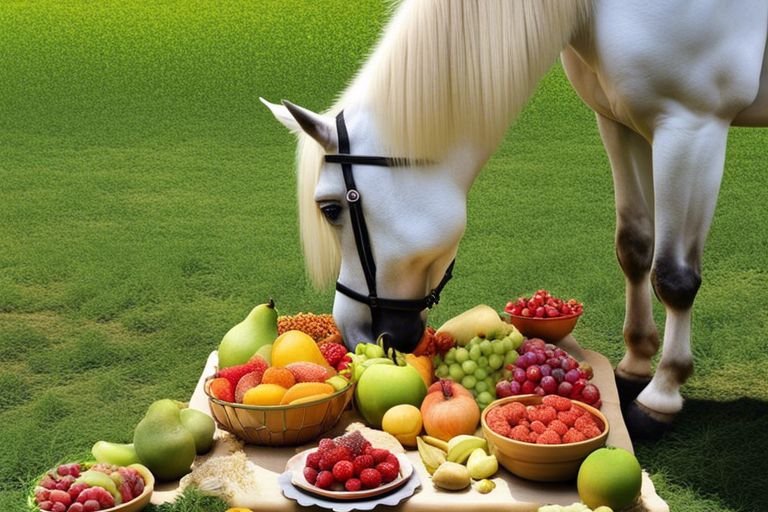It’s crucial to understand which fruits can be safely incorporated into a horse’s diet to provide both nutrition and variety. While horses primarily thrive on a diet of hay and grain, adding fruits can offer additional vitamins, minerals, and antioxidants. However, not all fruits are suitable for equine consumption, as some can be harmful or even toxic. In this comprehensive guide, we’ll explore which fruits are safe and beneficial for horses to enjoy, ensuring that your equine companions can indulge in fruitful feasts without any risks to their well-being.
Nutritional Benefits of Fruits for Horses
Vitamins and Minerals in Fruits
While fruits are a delicious treat for horses, they also offer a plethora of nutritional benefits. Any responsible horse owner knows that fruits can be a great source of important vitamins and minerals for their equine friends. Fruits like apples and bananas provide vitamin C, potassium, and other important nutrients that contribute to overall health and well-being in horses.
The Role of Antioxidants and Fiber
Role of antioxidants and fiber in fruits is crucial for not only maintaining a horse’s health but also boosting their immune system and promoting smooth digestion. Antioxidants found in fruits like berries and citrus fruits help combat harmful free radicals in the body, while fiber aids in proper digestion and gut health. Including a variety of fruits in a horse’s diet can help ensure they receive a good balance of these important nutrients.
Benefits of antioxidants and fiber in fruits go beyond basic nutrition – they play a key role in supporting a horse’s overall health and well-being. Antioxidants help protect the body’s cells from damage, while fiber promotes healthy digestion and can prevent issues like colic. By incorporating a range of fruits into a horse’s diet, owners can help ensure their equine companions stay happy and healthy for years to come.
Safe Fruits for Horses
Apples: A Traditional Treat
Some fruits are not only safe for horses but also nutritious and enjoyable for them. Apples are a classic favorite among horses, often seen as a traditional treat. They are rich in vitamins and minerals, such as vitamin C and potassium, and provide a sweet and juicy reward for your equine companion.
Berries: Varieties and Their Benefits
Any horse owner looking to add some variety to their horse’s diet can consider feeding them berries. Strawberries, blueberries, and blackberries are some safe options that horses can enjoy. Berries are packed with antioxidants, which help boost the immune system and promote overall health in horses.
Horses should not be fed large quantities of berries due to their natural sugar content, but as an occasional treat, they can add a burst of flavor to your horse’s diet. Always wash berries thoroughly and remove any stems or leaves before feeding them to your horse.
Feeding Practices
Now, before venturing into adding fruits to your horse’s diet, it’s crucial to understand the recommended feeding practices to ensure your horse’s health and well-being. For more information on how fruits can be beneficial even for insulin-resistant horses, check out Fruits are Fabulous – Even for Insulin-Resistant Horses.
How to Introduce New Fruits into a Horse’s Diet
An necessary aspect of introducing new fruits into a horse’s diet is to do so gradually. Start by offering small amounts of the fruit and monitor your horse’s response for any signs of digestive upset. Slowly increase the quantity over a few days to allow your horse’s digestive system to adjust.
Recommended Portions and Frequency
Practices for feeding fruits to horses should involve moderation. Offer fruits as a treat rather than a regular part of the diet. Limit the quantity to a few slices or pieces at a time, depending on the size of your horse. Monitor your horse’s overall calorie intake and adjust the portions accordingly to maintain a balanced diet.
Understanding the right portions and frequency of feeding fruits to your horse is key to prevent overindulgence and potential health issues. Consult with a veterinarian or equine nutritionist to tailor the feeding practices to your horse’s specific dietary needs and health condition.
Fruits to Avoid
Potentially Toxic Fruits
Potentially toxic fruits can be harmful to your horse if consumed in large quantities. Grapes and raisins, for example, can cause kidney failure in horses. Avocado is another fruit to avoid, as it contains a substance called persin, which can be toxic to horses. Similarly, citrus fruits like lemons and oranges can cause digestive upset in some horses.
Understanding Fruit Allergies in Horses
To ensure the well-being of your horse, it is vital to be aware of potential fruit allergies. Some horses may have sensitivities or allergies to certain fruits, leading to digestive issues or skin reactions. It is imperative to introduce new fruits gradually and monitor your horse for any signs of allergies, such as itching, hives, or diarrhea.
The key to providing a safe and nutritious diet for your horse is being aware of which fruits to avoid and understanding the possibility of fruit allergies. By following these guidelines, you can ensure that your horse enjoys a balanced diet without any risks to their health.
To wrap up
Taking this into account, it is necessary for horse owners to be informed about which fruits are safe and nutritious for their equine companions. By choosing the right fruits, horses can enjoy a variety of flavors while receiving necessary vitamins and minerals. Remember to always introduce new fruits gradually and in moderation to prevent any potential digestive issues. With a careful selection of fruits like apples, carrots, and bananas, horse owners can provide their animals with a well-rounded diet that promotes their health and well-being.
